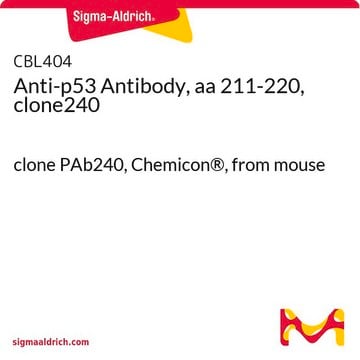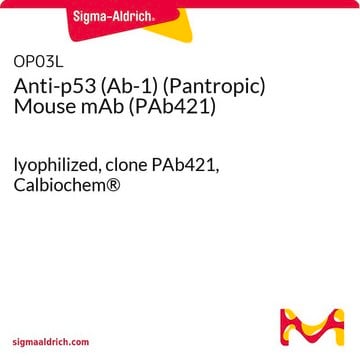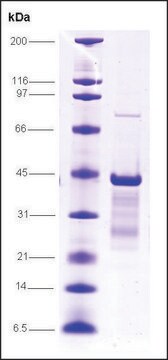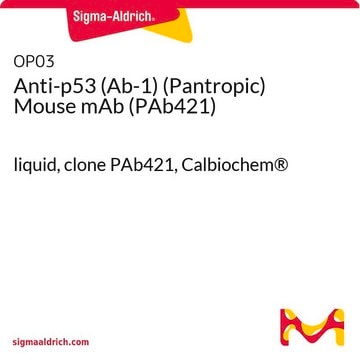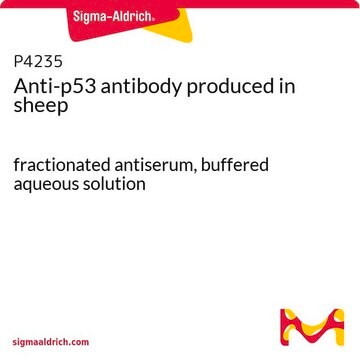おすすめの製品
由来生物
mouse
品質水準
抗体製品の状態
purified immunoglobulin
抗体製品タイプ
primary antibodies
クローン
PAb421, monoclonal
化学種の反応性
human, mouse
テクニック
immunohistochemistry: suitable
immunoprecipitation (IP): suitable
western blot: suitable
アイソタイプ
IgG2aκ
NCBIアクセッション番号
UniProtアクセッション番号
輸送温度
wet ice
ターゲットの翻訳後修飾
unmodified
遺伝子情報
mouse ... Trp53(22059)
詳細
p53 was discovered in 1979 as a cellular protein associating with the transforming protein of SV40 tumor virus. Since then, many different biochemical functions have been attributed to the 53 kDa phosphoprotein. Experimental evidence has suggested that p53 acts as a negative regulator of cell growth in normal cells). Thus, the inactivation or mutation of p53 may be an essential step in the development of malignancy. Wild-type p53 levels in normal cells and tissues were found to be very low. Mutant p53 polypeptide, however, is often found to be present at high concentrations in mammalian tumors and tumor cell lines. For example, in an immuno-histochemistry study 40% of human breast cancer showed elevated levels of mutant p53 in the cell nucleus. Mutations of the p53 protein have some characteristic features: Most of them are missense point mutations giving rise to an altered protein function. Also, many, but not all, mutant p53 proteins exhibit a common mutant structure, which can be recognized by monoclonal antibodies specific for p53 in the mutant conformation.
特異性
This antibody recognizes amino acids 376-378 of human p53.
免疫原
Epitope: Amino acids 376-378 in human p53
Partially purified mouse p53
アプリケーション
Research Category
エピジェネティクス及び核内機能分子
エピジェネティクス及び核内機能分子
Research Sub Category
細胞周期、DNA複製及び修復
細胞周期、DNA複製及び修復
Immunoprecipitation Analysis: A representative lot from independent laboratory immunoprecipitated p53 in IP (Lehman, T. A., et al. (1991). Cancer Res. 51(15):4090-4096.; Harlow, E., et al. (1981). J Virol. 39(3):861-869.)
Immunohistochemistry Analysis: A representative lot from an independent laboratory detected p53 in human breast cancer tissue (Davidoff, A. M., et al. (1992). Proc Natl Acad Sci USA. 89(8):3439-3442.).
Immunohistochemistry Analysis: A representative lot from an independent laboratory detected p53 in human breast cancer tissue (Davidoff, A. M., et al. (1992). Proc Natl Acad Sci USA. 89(8):3439-3442.).
Use Anti-p53 Antibody, clone PAb421 (Mouse Monoclonal Antibody) validated in WB, IP, IHC to detect p53 also known as Cellular tumor antigen p53, Tumor suppressor p53.
品質
Evaluated by Western Blot in mouse brain tissue lysate.
Western Blot Analysis: 1 µg/mL of this antibody detected p53 in 10 µg of mouse brain tissue lysate.
Western Blot Analysis: 1 µg/mL of this antibody detected p53 in 10 µg of mouse brain tissue lysate.
ターゲットの説明
~53 kDa observed
物理的形状
Protein G Purified
Format: Purified
Purified mouse monoclonal IgG2aκ in buffer containing 0.1 M Tris-Glycine (pH 7.4), 150 mM NaCl with 0.05% sodium azide.
保管および安定性
Stable for 1 year at 2-8°C from date of receipt.
Note: Variability in freezer temperatures below -20°C may cause glycerol containing solutions to become frozen during storage.
Note: Variability in freezer temperatures below -20°C may cause glycerol containing solutions to become frozen during storage.
アナリシスノート
Control
Mouse brain tissue lysate
Mouse brain tissue lysate
その他情報
Concentration: Please refer to the Certificate of Analysis for the lot-specific concentration.
免責事項
Unless otherwise stated in our catalog or other company documentation accompanying the product(s), our products are intended for research use only and are not to be used for any other purpose, which includes but is not limited to, unauthorized commercial uses, in vitro diagnostic uses, ex vivo or in vivo therapeutic uses or any type of consumption or application to humans or animals.
Not finding the right product?
Try our 製品選択ツール.
保管分類コード
12 - Non Combustible Liquids
WGK
WGK 1
引火点(°F)
Not applicable
引火点(℃)
Not applicable
適用法令
試験研究用途を考慮した関連法令を主に挙げております。化学物質以外については、一部の情報のみ提供しています。 製品を安全かつ合法的に使用することは、使用者の義務です。最新情報により修正される場合があります。WEBの反映には時間を要することがあるため、適宜SDSをご参照ください。
Jan Code
MABE283:
試験成績書(COA)
製品のロット番号・バッチ番号を入力して、試験成績書(COA) を検索できます。ロット番号・バッチ番号は、製品ラベルに「Lot」または「Batch」に続いて記載されています。
R Wadhwa et al.
Cell research, 9(4), 261-269 (2000-01-11)
In previous studies we have reported that a high level of expression of mot-2 protein results in malignant transformation of NIH 3T3 cells as analyzed by anchorage independent growth and nude mice assays [Kaul et al., Oncogene, 17, 907-11, 1998].
Richard D Dinnen et al.
The Journal of biological chemistry, 282(37), 26675-26686 (2007-07-20)
Cancer cells escape apoptosis by intrinsic or acquired mechanisms of drug resistance. An alternative strategy to circumvent resistance to apoptosis could be through redirection into other death pathways, such as necrosis. However, necrosis is a nonspecific, nontargeted process resulting in
C M Simbulan-Rosenthal et al.
Neoplasia (New York, N.Y.), 3(3), 179-188 (2001-08-09)
The tumor-suppressor p53 undergoes extensive poly(ADP-ribosyl)ation early during apoptosis in human osteosarcoma cells, and degradation of poly(ADP-ribose) (PAR) attached to p53 coincides with poly(ADP-ribose)polymerase-1, (PARP-1) cleavage, and expression of p53 target genes. The mechanism by which poly(ADP-ribosyl)ation may regulate p53
Meiqiongzi Zhang et al.
Frontiers in oncology, 7, 323-323 (2018-01-23)
The tumor suppressor gene TP53 is inactivated by mutation in a large fraction of human tumors. Around 10% of TP53 mutations are nonsense mutations that lead to premature termination of translation and expression of truncated unstable and non-functional p53 protein.
M-H Lee et al.
Oncogenesis, 1, e25-e25 (2012-01-01)
Expression of metastasis-associated protein 1 (MTA1) gene correlates with the degree of invasion and metastasis in hepatocellular carcinoma (HCC). Expression of MTA1 is induced by hepatitis B virus X protein (HBx); however, little is known about the transcriptional regulation of
ライフサイエンス、有機合成、材料科学、クロマトグラフィー、分析など、あらゆる分野の研究に経験のあるメンバーがおります。.
製品に関するお問い合わせはこちら(テクニカルサービス)